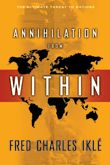 Here's an interesting book from Fred Charles Iklé, an expert in defense and foreign policy, nuclear strategy, Korea and the emerging international order. It's a 107 page book called Annihilation from Within that warns of potential security issues in a very future-realist sort of way.
Here's an interesting book from Fred Charles Iklé, an expert in defense and foreign policy, nuclear strategy, Korea and the emerging international order. It's a 107 page book called Annihilation from Within that warns of potential security issues in a very future-realist sort of way.What's interesting about this book is that Iklé is assessing the impacts of future technologies on security, and at the same time dismissing current geopolitical fixations such as the United States's global war on terror. These issues, including the killing in Iraq and Afghanistan, the danger of new terrorist attacks and the nuclear programs in Iran and North Korea are, in Ikle's opinion, already in the rearview mirror of history.
Instead, Iklé is looking at the pending impacts of such things as nanotechnology, superintelligence and other radical information and communication based technologies. Ikle recognizes the fact that we are in the midst of accelerating change, the outcome of which will not be subtle or easily predictable. Suffice it to say, however, the pending leap of history will "obliterate all previous notions about military power, pose a fundamental challenge to all religions, and eventually upend human civilization," he says.
Iklé recognizes that the quest is now on for superhuman intelligence. Its attainment, he says, will revolutionize all prior considerations about national security and transform the human condition. "We can no more imagine the political order of this new world," he writes, "than a group of chimpanzees in the forest can comprehend what goes on among humans in a nearby village."
Our greatest threat, Iklé argues, is a cunning tyrant gaining possession of a few weapons of mass destruction. His purpose would not be to destroy landmarks, highjack airplanes, or attack railroad stations, but rather, to annihilate a nation's government from within for the purposes of assuming dictatorial power. The twentieth century, he says, offers vivid examples of tyrants who have exploited major national disasters by rallying violent followers and intimidating an entire nation. As a recent interview of Iklé in the Washington Times noted:
"An aspiring dictator who is an insider endowed with political charisma and extraordinary strategic vision might have his henchmen obtain a couple of nuclear weapons. With a carefully timed use of these weapons the sudden nuclear devastation would cause great shock and widespread despair. The morning after, the new dictator could exploit this despair and political crisis to grab total power -- much like Lenin exploited the misery and chaos of war-ravaged St. Petersburg."It's refreshing to see a book written by a respected security advisor who has some sense as to what the 21st century is going to be all about. It's not a perfect projection, but at least we're getting there.
Here's a link to that Washington Times review, Annihilation Omens.

No comments:
Post a Comment
Note: Only a member of this blog may post a comment.